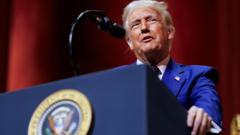Sinn Féin's choice to boycott the upcoming St Patrick’s Day celebrations in the White House marks a significant political stance, particularly in light of disparaging remarks made by Donald Trump about various global leaders, including Ukraine's President Volodymyr Zelensky. This decision appears to be a calculated move by Sinn Féin, aimed at granting them leverage among international audiences, especially in response to President Trump's controversial threats regarding Gaza and provocative language about Zelensky.
Historically, the first and deputy first ministers of Northern Ireland have attended these celebrations, fostering connections with key U.S. political figures and the Irish diaspora. Sinn Féin’s leadership, however, is betting that disengaging from these celebrations aligns better with public sentiment, given the mounting outrage against Trump's recent actions and rhetoric, seen as steps too far even by some past allies.
This strategic boycott thus poses potential risks. On one hand, it could solidify Sinn Féin's positioning as a party aligned with progressive values in response to perceived injustices and aggression on Trump's part. On the other hand, it threatens to strain relationships with prominent American politicians and alienate a portion of the Irish diaspora that supports Trump.
Sinn Féin's leadership, particularly figures like Michelle O’Neill and Mary Lou McDonald, appear to want to set a tone of conscientious objection to Trump's policies. O'Neill's announcement of this boycott from Dublin has not gone unnoticed by Unionist political adversaries who may spin this as a Dublin-led initiative rather than one indicative of Northern Irish interests.
The impact of this decision extends to the Deputy First Minister Emma Little-Pengelly, who may still seek to represent Northern Ireland in Washington if not vetoed by O’Neill. This complicated dynamic highlights the intricate nature of politics within Northern Ireland, especially as public sentiments clash with diplomatic necessities in an increasingly polarized environment. While Sinn Féin has made a bold choice, many will be watching closely to see how this gamble plays out on both domestic and international stages.




















